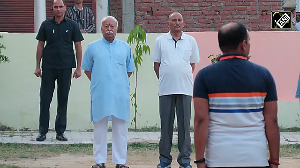Neelam Sharma got married three years ago and ever since, she has been fasting once a year diligently. "I fast only on Karwa Chauth. Me and my mother-in-law, both of us observe the tradition. It's good fun, actually!" she says.
What is Karwa Chauth?
Karwa Chauth is celebrated on the fourth day after the night of the full moon in the month of Karthik, according to the Hindu calendar (it takes place in the month of October or then November according to the English calendar). Wives observe a 24-hour long fast for the long life and wellbeing of their husbands.
Upon the occasion, wives start fasting at night, after the moon has risen, in the presence of their husbands. This fasting continues until the next evening, when the women dress up in their wedding finery and await the rising of the moon once more, which signifies that their fast can now be broken.
A clay pot or karwa is usually filled with special delicacies and jewellery and offered to the moon by way of worship -- hence the title Karwa Chauth (chauth meaning 'fourth night'). Once the moon-worshipping is done, the wives look at the moon through a sieve and then immediately turn to look at their husbands -- it is said that a woman should look at no-one but her husband straight after she has seen the moon through the sieve.
After the moon-worshipping, women receive their first bite of food from their husbands. The fast begins the night before in the presence of both the moon and the husband and ends only after the woman sees her husband and the moon together the following evening.
Of course, people in different regions of India tend to celebrate differently -- in Punjab, for instance, women wake up before the dawn to consume foods specially prepared by their mother-in-laws for the occasion. This food is called sergi. Hence, the Punjabi form of Karwa Chauth does not involve a 24-hour fast.
Modern-day Karwa Chauth
If the traditional method is not possible, there are allowances made in today's world for Karwa Chauth. If the husband is away on business, for instance, it may not be possible for the wife to see his face directly after looking at the moon. In such cases, a telephone call from the husband or his photograph will do to break the fast and begin eating.
These days there are even websites that offer gift hampers for the occasion!
Karwa Chauth is largely a festival followed by North Indians and some Western states. Says Sangita Sathye from Pune, "We observe khojari purnima (the day of the full moon) and not Karwa Chauth. We have a similar festival called Vata Purnima (a banyan tree puja held during the full moon) where women pray for their husbands."
However, newly-marrieds from the North are the most enthusiastic about celebrating this custom. Neelam reiterates that she loves Karwa Chauth. "My husband normally gets me something on that day. It's not part of the custom, but he likes to give me something. After all, I have made him feel special, haven't I?" she says.
She says all her friends observe Karwa Chauth. "Even if they don't follow any other tradition, they definitely do this. Only the ones who stay separate from the in-laws are not really keen on it," she says with a smile.
According to her, women from the North do not find the fasting difficult. "We have seen our mothers do it. So we know we can do it," she adds.
There are some women, however, who feel that we need to change with the times. "Karwa Chauth was followed by women in ancient times because they did not have any other avenues of enjoyment -- they rarely even went out of the house," says Rakhee Sinha from Mumbai. "I do not fast on this day. That does not mean I do not care for my husband. I just don't like fasts."
Unmarried girls too?
It's not surprising that many unmarried girls also follow this tradition. Twenty-two-year-old Renuka Bajaj from Jaipur says she loves to fast on Karwa Chauth, even though she is single. "My mom fasts, so I fast with her," she smiles.
Ask her if she does it for a good husband and promptly comes the reply, "Of course. Don't we all?"
Is Karwa Chauth celebrated in your home?
What do you make of the festival? Many feel that it is a regressive practice that takes away from gender equality, while others believe that it is a long-standing Indian tradition which should be kept alive and enjoyed.
What is your opinion? Do you/ your partner celebrate Karwa Chauth? Do you celebrate it of your own accord or does your family pressure you into it?
We want to know your take on it! Post your comments on the message board below!






 © 2025
© 2025